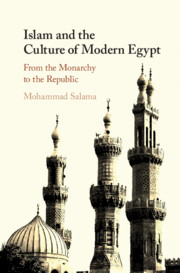
- Publisher:
- Cambridge University Press
- Online publication date:
- November 2018
- Print publication year:
- 2018
- Online ISBN:
- 9781108265027
- Subjects:
- Middle East Studies, Islam, Area Studies, History, Religion, Middle East History

Telling a new story of modern Egypt, Mohammad Salama uses textual and cinematic sources to construct a clear and accessible narrative of the dynamics of Islam and culture in the first half of the twentieth century. The conflict between tradition and secular values in modern Egypt is shown in a stimulating and challenging new light as Salama bridges analysis of nationalism and its connection to Islamism, and outlines the effects of secular education versus traditional Islamic teaching on varied elements of Egyptian society. These include cultural production, politics, economic, identity, and gender relations. All of this helps to discern the harbingers that led to Egypt's social transition from the monarchy to the republic and opens the possibility of Islam as an inspiring and inspirational force. This illuminating, provocative and informative study will be of use to anyone interested in the period, whether general readers, students, or researchers.
'This is a scholarly achievement of the highest caliber. Salama goes to great lengths to offer a compelling (re)reading of Egypt’s cultural history through the lens of literary theory in a project intent on deciphering the codes connecting Islam, culture, and modernity. He boldly identifies vital intersections between the formative tenets of modernity and conventions of Islamic thought … Salama’s book is bound to provoke vital debate that will enrich knowledge and elevate consciousness of a moment of history in Egypt’s culture which current generations are in dire need of revisiting and contemplating, as Salama does, armed with tools of contemporary literary theory. It shows us that we must not be content with reading our history using only the tools of the past. Modernity does not have a definitive endpoint and therefore readings and re-readings can only yield positive epistemologies and fresh understandings of both Islam and modernity.'
Gaber Asfour - Cairo University and Former Minister of Culture, Egypt
'Professor Mohammad Salama raises the perennial question of identity in modern times, in this case Egyptian identity … [he] has written an outstanding book not just for literary scholars and historians in Arabic studies but for all those reflecting on first world and third world culture.'
Peter Gran - Temple University, Pennsylvania
'This is a critically self-assured, excitingly competent, and beautifully written book. It is nothing less than a most formative treatment of a precisely delineated, historical slice of literary - but also broadly cultural - time that made Modern Egypt … This book may very well become the recommended - if not obligatory - reading for the present Egyptian generation: old and young.'
Jaroslav Stetkevych - University of Chicago
'This is a groundbreaking book. Salama’s goal is to address 'the relationship between Islam, culture and history' (p. 216) in twentieth-century Egypt, and he does an outstanding job of presenting relevant examples to his readers, from the first novel (Zaynab) to the films of Youssef Chahine. He personalizes and makes engaging his journey along the way, but never loses sight of important theoretical insights by both Arab and Western critics, and how they can illuminate the course of events he treats. No student of modern Arabic literature and culture can afford to be unacquainted with this work.'
Terri DeYoung - University of Washington
'Islam and the Culture of Modern Egypt is another insightful discussion of a field that has been inviting heated and also rigorous debates. In his effort to tackle issues of culture, modernity, and Islam, Salama offers a significant contribution to the intellectual history of Egypt.'
Muhsin al-Musawi - Columbia University
'Islam and the Culture of Modern Egypt is a tour de force treating the reader to a unique behind the scenes glimpse into the heart of Egyptian history and politics in the last century. In a highly original, lucid, and comparatively sophisticated diction, Mohammad Salama proves that despite Islam’s contested and celebrated reiterations in Egypt’s philosophical, literary, and cinematic production, it continues to shape our understanding of a precarious national identity during colonial, Islamist, Nasserist, Pan-Arabism, and revolutionary times. A vital contribution to the fields of Arab cultural and Islamic studies.'
Hanadi Al-Samman - University of Virginia
'His close readings of texts ... are often subltle and enlightening.'
Raphael Cormack Source: Times Literary Supplement
 Loading metrics...
Loading metrics...
* Views captured on Cambridge Core between #date#. This data will be updated every 24 hours.
Usage data cannot currently be displayed.
Accessibility compliance for the PDF of this book is currently unknown and may be updated in the future.